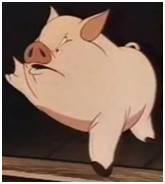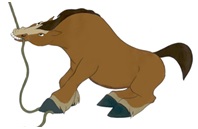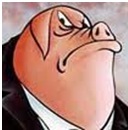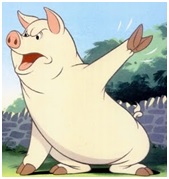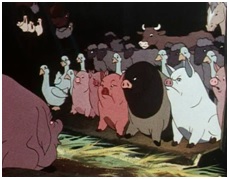|
 |
|
 |
Animal Farm - Leadership and Change
Animal Farm (1945)
Made its English author, George Orwell (1903-50), world famous.
Fun facts
Key characters Napoleon, pig and leader of Animal Farm (based on Joseph Stalin and Napoleon Bonaparte, pictured right). Snowball, pig who challenges Napoleon for control of Animal Farm after the rebellion
Boxer, hard working carthorse. Squealer, a pig and Napoleon’s propagandist (based on the Nazi Joseph Goebbels). Old Major, a boar and political idealist (based on Lenin and Karl Marx). Mr. Frederick, an untrustworthy neighbouring farmer (based on Adolf Hitler). Mr. Jones, the farmer of Manor Farm overthrown by the animal rebellion (based on Tsar Nicholas, overthrown by Lenin and the communists).
The story Old Major, a boar, tells the other animals of Manor Farm about his dream of them living there without the oppression or control of human beings. This is described in his song, Beasts of England. Even though Old Major dies three days later, the animals are inspired by his dream, particularly the pigs, Snowball, Napoleon and Squealer. They convert his principles into a philosophy called Animalism, which is based on seven ideals (the Seven Commandments) that make all animals equal and human beings their enemies. Snowball summarizes the Commandments in the maxim “Four legs good, two legs bad”. The animals seize the farm (re-named Animal Farm) from the cruel farmer, Mr. Jones, and then decisively beat him in the Battle of the Cowshed. At first they prosper. Snowball teaches the animals to read and Napoleon claims to be educating nine dogs in the principles of Animalism (but is actually training them as attack dogs). Snowball and Napoleon then struggle for power, particularly over the building of an electricity generating windmill. Snowball makes a passionate speech supporting the windmill but Napoleon, who fiercely opposes the plan, orders his dogs to attack Snowball and drive him off the farm. So Napoleon becomes the animal leader (or dictator), saying that the pigs will make all the decisions for the good of everyone else. Napoleon quickly changes his mind about the windmill and the animals (especially the carthorse, Boxer) build it. But it blows down after a storm. He blames this (and any other problems) on Snowball. Napoleon falsely claims that Snowball returned to sabotage it, helped by his old supporters. Napoleon orders his dogs to kill Snowball's supporters and, subsequently increases his power, re-writing history in his favour and behaving more like the dreaded human beings (by sleeping in a bed, drinking whisky and trading with neighbouring farmers). The original Animalist principles strictly forbid such activities. But Napoleon's propagandist, Squealer, convinces the working (i.e. non-pig) animals that Napoleon is a great leader, despite their cold, hunger and overwork (working a 60 hour week including Sundays). Mr. Frederick, a neighbouring farmer, cheats Napoleon in the purchase of some timber and then blows up the windmill which had been re-built at great expense. The animals defeat the farmer in the ensuing battle, but Boxer is badly wounded. Soon after Boxer disappears, Squealer says he died peacefully in hospital. In reality Napoleon had sold him for slaughter to a glue maker to get money for whisky. Over the years, the ruling pigs become more and more like human beings, walking upright on two legs, carrying whips and wearing clothes. Then Napoleon allies himself with human farmers against the poor human and animal workers and changes the name of Animal Farm back to Manor Farm. The working animals can’t now tell the difference between the pigs and human beings.
Lessons for leadership and change 1. Knowledge is power The ordinary animals are powerless because they don’t have the right knowledge to challenge Napoleon Through his propagandist, Squealer (pictured right in the 1954 film)., he conceals the truth with:
Boxer's (pictured right) two maxims that he keeps on repeating are
2. Dictatorship is distasteful The book shows that absolute power corrupts absolutely. The dictator Napoleon (pictured right):
This principle is: “All animals are equal, but some animals are more equal than others”. Napoleon's leadership suffers from:
3. Loyalty may not last Napoleon’s power over the common animals comes from:
His leadership won’t last without coercion, particularly if the truth is discovered about his treatment of Boxer and Snowball (pictured right).
4. Idealism isn’t enough Snowball hasn’t the ability to carry out his noble ideals of
His intellect and inspirational speeches prove no match for Napoleon’s ruthless terror. Old Major’s idealistic song of the rebellion, Beasts of England, is banned by Napoleon. 5. Vision and principles are important Old Major’s visionary speech (pictured right in the 1954 film) of a socialist Utopia (or perfect world) inspires the animals to rebel. But Napoleon’s corrupt dictatorship shows that principles are only as good as the people who implement them. Immoral leaders pervert principles for their own ends. The rebellion (as in the Russian Revolution) replaces one cruel dictator (Mr. Jones, the farmer) with another (Napoleon).
6. Conflict is inevitable Old Major says that:
But conflict still exists after the revolution. Napoleon is as cruel and exploitive as Mr. Jones, the farmer. For example, Boxer accepts his leadership and is killed, despite his years of loyalty, bravery and hard work. The pigs consume all the milk and the apples, because (Squealer says) they need them to rule everybody else! 7. Religion repels rebellion The character of Moses, a raven, shows how religion can pacify people and, as Karl Marx (pictured right) put it, become the “opium of the people”. Moses spreads stories of Sugarcandy Mountain, the paradise animals (however oppressed and mistreated) go to when they die.
8. Leaders are nothing without people Workers (like Boxer):
For example, Boxer plays a big part in building the windmill, and it is only Napoleon’s incompetence (the walls are too thin) that leads to its collapse in a storm.
9. Power to the people The animals work hardest when they feel they are working for:
But they become increasingly disillusioned, as they see:
George Orwell said the moral of his book was that revolutions only improve ordinary people’s lives when they: “know how to chuck out their leaders” once they’re no longer useful. The ordinary animals suffered because they didn’t have the power to remove Napoleon.
10. Slogans can be subverted Snowball summarizes the principles of Animalism into the slogan “Four legs good, two legs bad”. But it is used by the pigs as a mantra for blind obedience to Napoleon When they are walking on two legs. the pigs themselves finally subvert the slogan into “Four legs good, two legs better”,
Key quotes on society All animals are equal, but some animals are more equal than others. Man is the only creature that consumes without producing.
Key quote on workers and unions Never listen when they tell you that Man and the animals have a common interest, that the prosperity of the one is the prosperity of the others, Old Major.
Two literature websites to recommend 1. sparknotes.com 2. litcharts.com |
|
|
||
|
|
|
||
|
||
| Copyright © wisdomtowin.com All Rights Reserved | ||
|

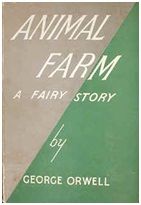
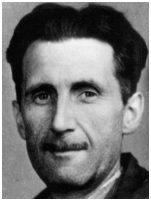

 (based on the Russian revolutionary, Leon Trotsky, pictured right) .
(based on the Russian revolutionary, Leon Trotsky, pictured right) .